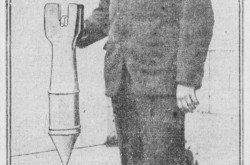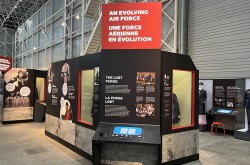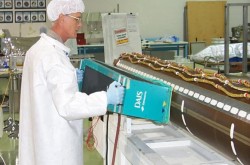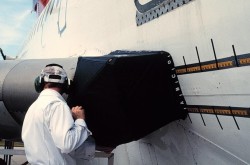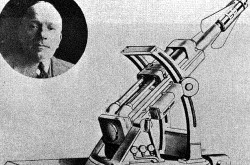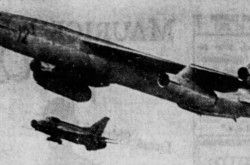Série Échos épisode 6 – Le retour
Dans ce dernier épisode, des vétérans expliquent ce qu’était leur vie après la guerre. De plus, le cadet Mathieu et le capitaine Ti-Jean discutent des conséquences de la guerre. Les étudiants participants parlent également de ce que représente le projet Échos pour eux. Ils disent avoir mieux compris, grâce aux entrevues réalisées auprès de vétérans de l’Aviation royale canadienne, les réalités de la guerre dans les airs et ses conséquences au sol, ici, en Europe et en Asie. À mesure qu’ils filmaient et montaient les séquences pour produire les six épisodes du projet Échos, les étudiants comprenaient davantage les souffrances et les accomplissements de ces hommes et de ces femmes. Ils sont fiers d’avoir pu établir des liens avec la « plus grande génération ».
Transcription
0:13
As a young fella, you’re twenty or twenty-one years old.
0:18
You’ve just left your mother, who told you what to do: wipe your nose or whatever else.
0:25
Then you got told where to go and to wipe your nose by these corporals, sergeants, and so on.
0:33
You’re in the Army: you’re told what to do, all the time, everywhere.
0:37
The war ended.
0:38
Now, you’re not going to be told what to do.
0:42
Now what?
0:43
What happens now?
2:02
I’m very upset—because I thought my number
2:06
was due—because somebody else’s number came up, and I had a lower number.
2:12
So I went to the sergeant, and I said, “They didn’t call my number.”
2:17
He says, “So what?” or whatever he said.
2:20
And I said, “Well, can you tell me?”
2:22
He said, “What’s your number?”
2:23
“R266054.”
2:26
He pulls the paper and says, “It’s not on here!”
2:31
I said “Well, when am I going?”
2:33
“Haven’t any idea.
2:34
We’ll call you.”
2:36
That was it: nobody knew when you were going.
2:40
So when I did hear, I was told that I would more than likely not go home till Spring.
2:48
So I spent the good part of a year on the Continent,
2:52
working at headquarters and waiting to go home.
2:56
Which was, you know . . . the war was over; I had no patience.
3:00
None of us had patience.
3:03
You know, the question was: well, what do we do now?
3:08
The station commander wanted to keep control over us (laughs), in case we didn’t go too
3:15
wild and so on from partying a bit.
3:18
So he organized sport days.
3:21
That kept us busy and occupied and so on—smart move.
3:27
After the war was over in Europe, they had thousands of us in England
3:35
that they didn’t know what to do with; so they had holding units.
3:40
I was there about two weeks or so.
3:43
I was told that I was now the new stage electrician for a RCAF show that was
3:53
travelling in Europe, and everything else.
3:56
I had the best six months of my Air Force career right there.
4:02
We felt important, you know.
4:06
Everybody knew there was a show in town, and they were going to play a performance—tonight.
4:14
It was a variety show.
4:16
We did sort of the opening number.
4:20
We did a tap routine: one where we dressed up like cowboys, cowgirls.
4:25
We did different types of dancing.
4:29
This was our opening number, and we had these jackets on that shone in the dark.
4:33
It was black—see, the first show was blackouts, but we were all-clear.
4:38
So we had this costume on, and this jacket.
4:41
And somebody yelled, “All-clear!”
4:43
And the curtain opens, and we were just in these teddies and black stockings.
4:47
Well, the whistles and the hoots and the hollers were so loud that we couldn’t hear the music.
4:56
So they changed the costumes.
5:01
I wouldn’t trade it for anything.
5:04
It was the best time there was, and we were treated so well, you know.
5:09
You hear of girls joining up into the Armed Forces: their parents wouldn’t let them go,
5:14
because they figured there was a lot of hanky-panky or whatever that was going on—
5:20
nothing like that at all.
5:26
Where are the props?
5:27
No propellers.
5:29
It’s a jet fighter.
5:30
Hmm.
5:32
I knew we were testing them at the end of the war…No propellers.
5:36
What will they think of next?
5:38
No pilots.
5:39
That will be the day.
5:41
Good to be back home, Johnny?
5:45
It's easy, I’ll tell ya that.
5:48
It took awhile.
5:49
Waiting and waiting.
5:50
And then more waiting.
5:51
A lot of blanket drills in between.
5:54
Blanket drills?
5:55
Naps, Andy.
5:56
Naps.
5:58
If they didn’t discharge me when they did, I was going to snatch up my old Lanc and fly
6:02
back to Canada on my own.
6:04
Couldn’t wait to get home, eh?
6:05
No!
6:06
Could you?!
6:07
I couldn’t wait to see my girl and my ma my pa, brothers, sisters… but…
6:14
But what?
6:18
But I think, I’m going to miss…
6:20
Miss your old crew, right?
6:22
Yeah, them for sure, but
6:27
there’s something about the fighting.
6:31
About cheating death.
6:35
The rush of it all.
6:38
I’m going to miss that.
6:40
But now you have your whole life ahead of you?
6:43
That’s what I’m scared of Andy.
6:46
That seems a lot scarier than what I’m leaving behind.
6:50
Wonder why that is?
7:09
We were glad to be home.
7:12
The next morning, we arrived at Central Station in Montreal, and my whole family was there:
7:18
my mother, my father, my sisters.
7:22
I was coming home.
7:25
My God, what a joy!
7:27
It was a moment that we’ll never forget!
7:32
It was nice to get home.
7:33
It was kind of a let-down, though, because the excitement was over.
7:37
The war is over (laughs).
7:39
When we landed in Canada, they had a big band playing and all that, and we all got off.
7:44
The people were all there at Nova Scotia.
7:49
and... ah... There was a train on the tracks right there, and so, one of the guys that looks after each
8:00
cabin—or whatever you want to call it— there’d be about
8:03
twenty guys on that one section.
8:07
We all had a single seat; when we went overseas, there would be three guys in that seat.
8:13
And we had no papers, here we got, “Where are you from?
8:16
Toronto?
8:16
Here’s the Toronto paper.”
8:18
And so they'd say
8:20
And when it came time for us to sleep at night, those things made into a bed
8:24
for us, so we could sleep.
8:28
He would say, “Go down to the end of the room and have a smoke, and you can get a beer
8:32
down there, and I’ll make up your beds.”
8:35
And I said, “Well, we can make our beds.”
8:37
“No, no, that’s my job.”
8:39
He was an elderly man.
8:41
So he made the beds.
8:42
He says, “I want you to leave your shoes out here, so I can shine them for you.”
8:46
I said, “Are you joking?
8:48
Nobody ever shines—” “I want you to do that.
8:51
He says, Look at me, I never went to the war.
8:54
I want to do something for you guys.”
8:57
I could cry when I hear things like that.
9:00
Anyways, we would go to a special cabin, or train, to eat.
9:08
That never happened before.
9:09
They’d say, “What do you want?
9:11
Three, four eggs? Six eggs?
9:13
How many do you want?
9:14
How do you want them cooked?”
9:15
You know, the cook would say, “He wants them this way: just slightly over.
9:20
OK.
9:21
How about the bacon?
9:22
How many bacon do you want?
9:23
Do you like it this way or that way?“
9:25
And toast!
9:26
Ohhh, he knows how to make— And you know, it’d be running down your cheeks.
9:32
You’d say, “My God!”
9:34
You know?
9:35
But that was “The war was over.”
9:38
We were home.
9:40
We were saying, “Geez, we never had milk, we never had butter;
9:45
never had jam or anything like that.”
9:48
So landing home was just— It was home, we knew it.
9:56
Getting home was kind of interesting, because I had phoned Mum from Ottawa.
10:04
I said, “I think I can probably make the Owen Sound, the Alfred train,” that goes
10:11
up from Toronto.
10:13
When it was due to arrive, the whole village was out to greet me.
10:21
And of course, somehow, I couldn’t make that train, and I didn’t phone.
10:29
But I hitchhiked up from Toronto.
10:32
It was the day after when I got up there.
10:36
And our place had a long lane—a country lane, you know.
10:44
He drove me up the lane, and stopped and I got out.
10:49
And Mom was there on the porch, ready for me.
10:53
It was great.
11:00
Settling into home life?
11:02
Getting back to the old routine?
11:04
Everyone’s been great.
11:06
When I first got home there were lots of pats on the back, you know.
11:10
A parade for all of us who fought.
11:12
Free drinks. That sort of thing.
11:15
But, life goes on.
11:18
Some of the vets I met, they have their whole life mapped out for them.
11:23
All types of government assistance to help them out.
11:29
But to tell you the truth Andy,
11:35
I’m kinda in the soup.
11:40
Like I’m flying through a dense fog all the time.
11:49
I’m jumpy when it comes to loud noises.
11:55
On edge all the time.
11:59
I don’t sleep well…
12:03
I wish I were over there.
12:05
So I wouldn't have to think about it all the time…
12:11
I just want to fly missions.
12:16
That’s what I’m good at.
12:18
Flying missions.
12:19
That’s what I do.
12:21
Did. Johnny
12:21
That’s what you did.
12:24
You know, you might have what they call PTSD.
12:28
PT what?!
12:29
Post-traumatic stress disorder.
12:31
Those are some fancy five-dollar words you’re spitting out there Andy.
12:35
In English?
12:36
PTSD is a mental disorder some veterans get from fighting in wars.
12:41
No.
12:42
(laughs)
12:46
No!
12:47
I’m not a nut case!
12:51
That's not what I'm saying.
12:52
It can be controlled.
12:52
Enough!
12:53
We’re done talking about it.
12:56
I’ll be…I’m fine.
13:02
And you don’t tell anyone.
13:03
You hear me!
13:24
I went to law school, I stayed for awhile, but I could see
13:27
after, I couldn’t settle down.
13:29
I guess my mind was someplace else.
13:31
So I left there, and I started to work.
13:34
Finally, I worked for Blue Cross.
13:36
That eventually became OHIP.
13:40
So I spent my working days with OHIP.
13:42
I went right back to university.
13:44
You know, the army supported my wife and me ‘til I graduated.
13:50
I walked into the Bell office in Montreal—a big recruiting office, right inside the door.
13:57
And I went over to the little girl and said, “I was thinking of applying for a position.”
14:03
She said “What are your qualifications?”
14:05
Well, I said just the right words: “I just got my diploma from McGill,
14:11
and before that I was in the Air Force, in radar.”
14:15
She said, Is that anything to do with wireless?”
14:17
I said, “It’s completely wireless!”
14:19
She says “Well. We’re looking for people
14:21
with a university degree who have experience in wireless!
14:26
Would you wait a minute?”
14:27
So she went and got her boss, and he took me up to the big boss of the department they
14:32
wanted me to go into.
14:33
He said, “Could you start tomorrow?”
14:36
“Well maybe. I could start next week!”
14:38
And so I started the following Monday.
14:40
And thirty-six years later: “Thank you, radar; you got me in the door.”
14:45
I taught Morse code to the Scouts, at a time when women were not allowed into the Scout
14:52
troops at all.
14:54
But, because of the necessity of the boys to learn Morse code,
15:01
I was permitted into the troop.
15:05
Got home, went into the university, and graduated as a civil engineer.
15:15
And then right straight into work.
15:18
I had been thinking of going to visit CIDA, and ask if they had something that I could do.
15:26
The very day that I was planning to see them, I got a call
15:31
from this general, saying, “How would you like to go to Burma?”
15:37
I thought about it a long time—one second—and I said, “Yes!”
15:42
I went to de Havilland—in 1953, I think it was.
15:50
And I was there until I went
15:57
to join Ken Molson, who was the curator in the National Aviation Museum.
16:04
It was a wonderful time that I first realized that this is what I wanted to do:
16:10
help to preserve airplanes and, in my own time, paint what I was to paint, which was aviation scenes
16:23
of historic events in particular.
16:27
Guess what?
16:28
I’m flying again.
16:29
That’s great.
16:30
Where? With who?
16:32
I’m flying a busher for a hunting and fishing lodge.
16:35
That’s sounds about right.
16:36
Yeah.
16:37
I’m taking rich muckety mucks up North so they can bag a bear, or a moose, and put its
16:43
stuffed head on their mantelpiece.
16:44
And then brag about it over whiskey and cigars.
16:47
Sounds gross.
16:49
Which part?
16:50
The stuffed animal heads part.
16:52
Who are we to judge.
16:54
I’m just glad I found something.
16:56
So many of them who were over there haven’t.
17:00
Some of them were real war heroes.
17:02
Chest full of medals.
17:06
Now forgotten.
17:27
When the war started, I was just a kid in
17:31
the ninth grade.
17:33
When the war ended, I was a lieutenant in the Air Force.
17:37
A full grown man, even if I was only twenty years old.
17:41
When I looked around me, I thought I was pretty smart—and pretty lucky.
17:49
I had seen London, and Paris, and Algiers and things like that,
17:55
I was pretty full of myself when came back.
17:59
It wasn’t hard to get me to talk about what I’d seen.
18:04
I don’t like talking about the war as such—the killing and so on, that went on.
18:11
That was our job: we did it, and there was no question.
18:18
We couldn’t argue about it; we just did it.
18:21
But the other part—the playing part—was great.
18:26
And I told everybody about that.
18:30
But I think, as time goes on, people will forget.
18:35
I think after the war was over—the First World War was over,
18:39
say in the twenties—people forgot that.
18:41
Like we have a tendency to forget our last war here.
18:47
The other thing is that things are moving much faster now than they were
18:50
twenty years ago, or forty years ago.
18:52
People are much busier doing other things.
18:59
Well, it’s been said, and it’s true: “History is thirty seconds ago!”
19:05
I want people to always remember the historical aspect of what they do,
19:14
and what other people do.
19:16
It’s important to preserve.
19:19
When you think of it, the German people are human, too.
19:25
And it wasn’t the German people who started the war.
19:31
It was their leaders, who felt they could
19:37
have more land or create a greater presence in the world.
19:47
But you meet German people now, and they’re just the same as you and I.them
19:55
I work with them at the senior’s centre.
19:58
They’re great.
20:03
Now that you’re back and working, what do you miss the most about the war?
20:10
I miss my crew.
20:13
The rest is fading.
20:15
But my crew, we had some good times!
20:20
Close shaves too.
20:23
We try to keep in touch, but I live up North and they’re all over the country…
20:29
it’s not the same.
20:31
Probably will never be?
20:33
No, probably won’t.
20:36
Best to put that road behind us now and move on.
20:41
It was something though.
20:42
Something worth repeating?
20:45
That’s not up to me Andy.
20:48
But who better to tell others why we shouldn’t have wars, than veterans.
20:52
You think anyone will listen?
21:13
War doesn’t really solve anything in the final analysis.
21:17
It’s just a lot of people have their lives ruined, and are killed and maimed. and I. . .
21:25
I think there should be more emphasis on peace.
21:28
The whole philosophy should be that war is bad.
21:33
There’s no doubt that our war had to be fought, because Hitler and Mussolini were
21:41
going to take over the world—and they nearly did.
21:45
But there is a point where you should be able to stop that ahead of time.
21:49
I don’t know what it is.
21:54
Well, love each other, I think love each other, I think I would say
21:59
because that solves everything.
22:01
Love saves everything.
22:05
But that’s practically impossible; so I don’t think that’s going to happen.
22:12
I realize that we have differences, but if we can only
22:22
look at the other person’s point of view,
22:26
maybe we would avoid a lot of conflict and heartache.
22:34
It’s very difficult to constantly feel you are the only one who knows what’s right.
22:48
Just realize: listen to them, and then judge whether you are right, or whether the other
23:01
person might have a tiny bit of knowledge, too.
23:08
It would be nice to see the world become peaceful, and everybody started getting along with one
23:16
another, instead of having to fight with one another.
23:20
Fight for peace.
23:22
I think that’s the only thing.
23:23
I think war is a terrible thing.
23:26
And, as I said, we lost thousands—well, we lost millions altogether during the war.
23:34
It’s terrible, and I would do everything to avoid it.
23:43
Somebody who wants to conquer somebody—you can try to negotiate it, and you can threaten.
23:52
But if they don’t stop, you’ve got to stop it.
23:57
And you should be prepared, and never be not prepared.
24:05
Keep up your Army, your Air Force, your Navy.
24:15
That’s as much as I think I can say.
24:19
You’ve got to be able to fight back.
24:23
You’ve got to be able to fight back.
24:27
I thought, “Well, let’s go back and live happily ever after!”
24:31
I really did.
24:32
When I got home:
24:35
that’s done. I’ve been to a war; it’s terrible.
24:39
Whatever, whatever, whatever, but it’s over!
24:42
But, we’ve had a war ever since.
24:48
I hate it.
24:55
You know Andy experience teaches you a lot of things in life.
25:00
My only hope is that future generations will see what we did in the war,
25:05
the sacrifices, the accomplishments,
25:08
and that they learn something from it.
25:11
Or else, it would be all for not.
25:14
And that would be a shame.
25:17
I believe they will Johnny.
25:19
I have a good feeling about it.
25:25
That’s good.
25:51
What I would say to the veterans that went through World War Two?
25:55
I would say, “You guys are awesome to be able to just drop everything.”
26:00
‘Cause most of these people were high-school students.
26:02
They were nineteen, they were seventeen, when they went off.
26:05
To be able to say goodbye to your family, to be able to pack up and go fight this war
26:10
for your country—I think that’s something that is really cool.
26:14
Because nowadays, a lot of people don’t really stand up for themselves, let alone
26:19
a whole country.
26:21
And for them to be able to do that—and either to survive or die in the battle—
26:27
that is amazing that they have this tale to tell.
26:33
These veterans make the Second World War more authentic, closer to people.
26:42
These pilots have seen a bomb bay door open above them, and risked having thirty bombs
26:46
drop on them, if they didn’t do something.
26:48
They’ve been shot at, and have had to parachute down to survive, when the rest of their crew died.
27:00
What happened during the Second World War is intense.
27:02
And I feel more connected to it now.
27:07
Listening to Mr. Gélineau’s interview, I feel like I know him now.
27:11
Like, I’ve never met the guy before, but I feel as if I know him.
27:16
It’s kind of amazing.
27:18
These guys and girls have some great stories behind them that need to be told,
27:25
need to be put on record.
27:27
And it would be a complete shame if they just got lost.
27:31
I don’t know . . . it’s just something I find fascinating
27:33
just hearing their stories, you know.
27:35
You watch a movie, or read a book, but when you actually hear it from someone who’s
27:40
experienced it, it’s totally different.
27:44
They are only veterans’ stories.
27:46
They’re not some guy who read about these things in a book.
27:49
These people have lived through it.
27:51
It’s real; it’s honest.
27:54
When they speak, you can feel the emotion in their voices, and in their eyes.
27:59
This is their actual lives.
28:02
It’s important for younger generations to never forget what older generations
28:07
did for us, because we wouldn’t be where we are.
28:10
And it’s just important to know that war is really not a good thing.
28:14
And a lot of people died, and I hope it doesn’t happen again.
28:18
Once hearing all the stories from the actual people that lived through it, it hits a lot
28:24
harder, and it makes you care a lot more about what happened.
28:28
As I remember in high school, it was kind of basic: learn the dates, learn the locations, study
28:33
for your exam, and that was pretty much it.
28:36
But to sit there and listen to everything they have to say, you know, you get attached
28:41
to these people—to these, you know, these fighters.
28:45
Even though some of them were just nurses, fighter pilots or just navigators,
28:54
each one of them has played an important role in our history.
28:57
To be able to make an emotional connection with the person, to tell future generations,
29:03
I think that is a really cool thing.
29:05
You know, I’m really thankful that they were there.
29:10
You have two generations facing each other.
29:13
On one side, a generation that lived through bombings and had to go to war.
29:18
On the other side, a generation that’s holding an iPhone and has everything at its fingertips.
29:26
I think we have a lot to learn from these men and women.
29:28
We need to take the time to give them a voice.
29:31
We need to remember them.
29:35
We need to pay attention to what they’re telling us.
29:38
A lot of veterans want to pass on what they know.
29:40
We’re losing more and more of them as time goes on.
29:44
It’s like our last chance to hear them tell their stories.
29:52
Young people need to understand the past
29:53
in order to better understand what’s going on today.
30:03
Just knowing about what these soldiers did— what the war was about, why it happened—
30:08
would help educate the younger generation against having it happen again.
30:15
History is something that should be remembered and never forgotten.
30:22
They were young, as we are young.
30:25
They served, giving freely of themselves.
30:30
To them we pledge, amid the winds of time, to carry their torch and never forget.
30:39
We will remember them.
30:41
We will remember them.



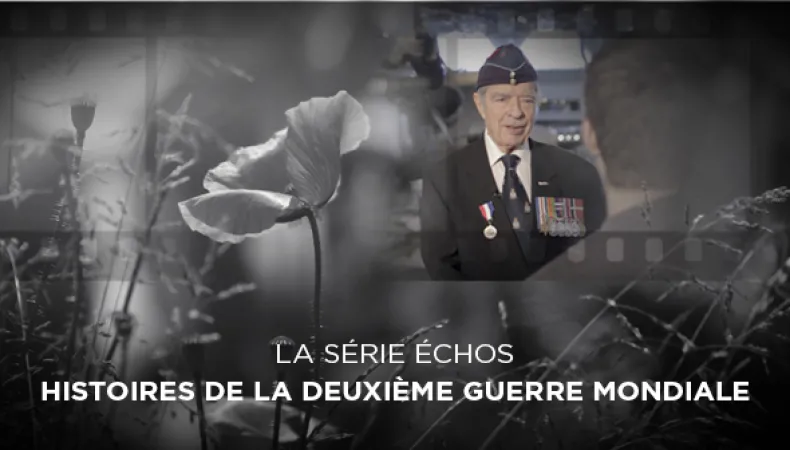

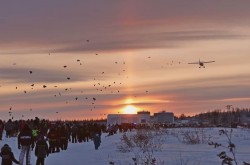

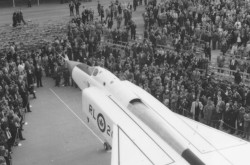




![Un bloc de photographies montrant quelques-unes des personnes impliquées dans le bombardement des bélugas de l’estuaire et du golfe du fleuve Saint-Laurent. Anon., « La chasse aux marsouins [sic]. » Le Devoir, 15 août 1929, 6.](/sites/default/files/styles/thumbnail_7/public/2024-09/Le%20Devoir%2015%20aout%201929%20page%206.jpg?h=584f1d27&itok=TppdLItg)

